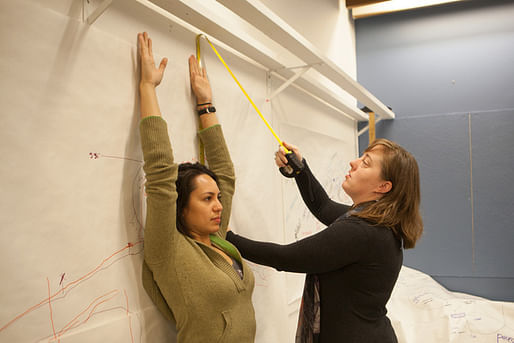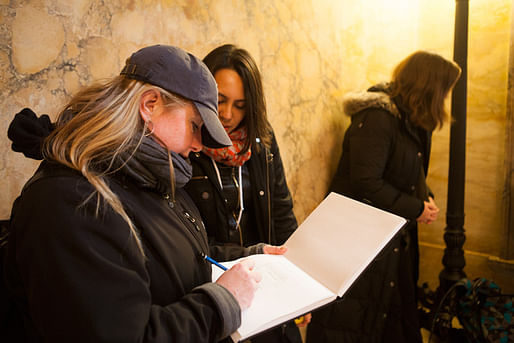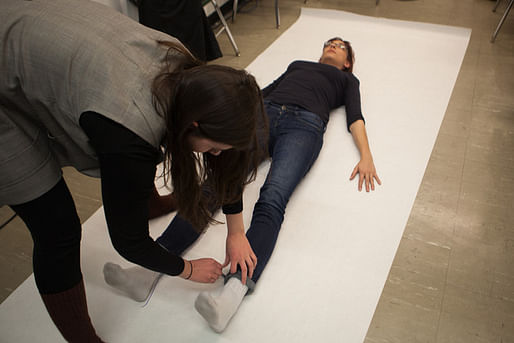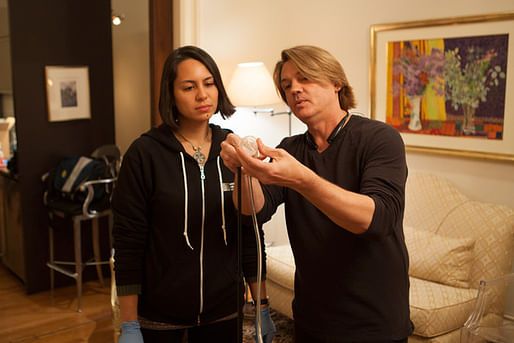
The Master of Design Studies in Design for Human Health (MDS-DHH) is the first low residency—primarily online—master’s program dedicated to health and wellbeing within the built environment. This program is available at the Boston Architectural College (BAC) to international and domestic students who have an accredited undergraduate degree and have met the program’s admissions requirements.

↑ Body mapping exercise during Intensives week.
The low residency MDS-DHH program made a splash in the design world in September 2014 because it was the first program to offer designers and supporting professions the opportunity to specialize in the rapidly growing area of design for health. With baby boomers aging, chronic diseases becoming more prevalent, and our ever increasing time spent inside of the built environment the demand for specialized knowledge related to design and human health has never been higher.
The MDS-DHH program explores real-world situations in order to identify innovative solutions that go beyond basic guidelines. Courses are taught by practicing professionals, who have dedicated themselves to the advancement of the human condition within the built environment. With many completely online courses, and the College’s practice-based philosophy, the MDS-DHH program is ideal for the working professional.

↑ Class exercise in the Boston Public Library.
“As a professional Interior Designer the MDS-DHH has advanced my research methods and allowed me to gain a wealth of knowledge that I am transferring into current real design projects, and has enabled me to enrich the client relationships for their wellbeing and investments.” - Caroline Repard, R.I.D.
The Boston Architectural College’s dynamic subject matter experts lead courses that have an average student to faculty ratio of 10:1. Students in the MDS-DHH program receive individual attention while learning collaboration skills in peer groups. The BAC’s design studios form the core of the program and require students to integrate scientific facts with artistic appeal to create design concepts that address a variety of issues related to health and wellbeing.

↑ Body mapping exercise during Intensives week.
“The program taught me to take a more systematic and effective approach to design. The project courses provided the means to experiment and develop design ideas and concepts from a human health and well-being perspective. The project work has helped me move design ideas from the realm of imagination into the world of reality.” - Emil Jacob
A distinguishing feature of the MDS-DHH program is the eight-day residencies that take place once a semester in the city of Boston. These residencies forge a strong interdisciplinary community of students and faculty from the different subject areas of Architecture, Sustainability, and Historic Preservation. These collaborations enhance the depth and quality of each student’s learning experience. During the intensives, the city of Boston is used as a living laboratory to study important concepts related to air quality, crowding, walkability, personal privacy, and accessibility. Students also use the city to engage in observations, photo documentation, and interviews related to human behavior in action, visual clues of real and potential hazards, and perceptions of health and safety. The MDS-DHH program puts a strong emphasis on critical thinking, integration of art and science, leadership, and ethics in order to prepare graduates to spearhead change in their firms, within their community, and with their individual clients.

↑ Taking samples in residence.
“The Design for Human Health program is an amazing program that has allowed me to merge my interests in art and science. In this program I am learning how to use evidence-based design to integrate my interests in human biology, psychology, and sociology. I can honestly say that I have gained many valuable skills that will help me be a better designer!” - Janet Roche
The low residency MDS-DHH program extends and builds upon the Boston Architectural College’s 125-year tradition of active learning, and the program compliments the USGBC’s and WELL Building International’s content areas for the WELL-AP credential and the new WELL building certification standards. We are currently accepting applications for Fall 2016, apply today or contact us at 617.585.0123 to request more information. To learn more about this program and other Boston Architectural College programs, please visit our website and see why the Boston Architectural College is one of the leading colleges for aspiring designers!
No Comments
Block this user
Are you sure you want to block this user and hide all related comments throughout the site?
Archinect
This is your first comment on Archinect. Your comment will be visible once approved.